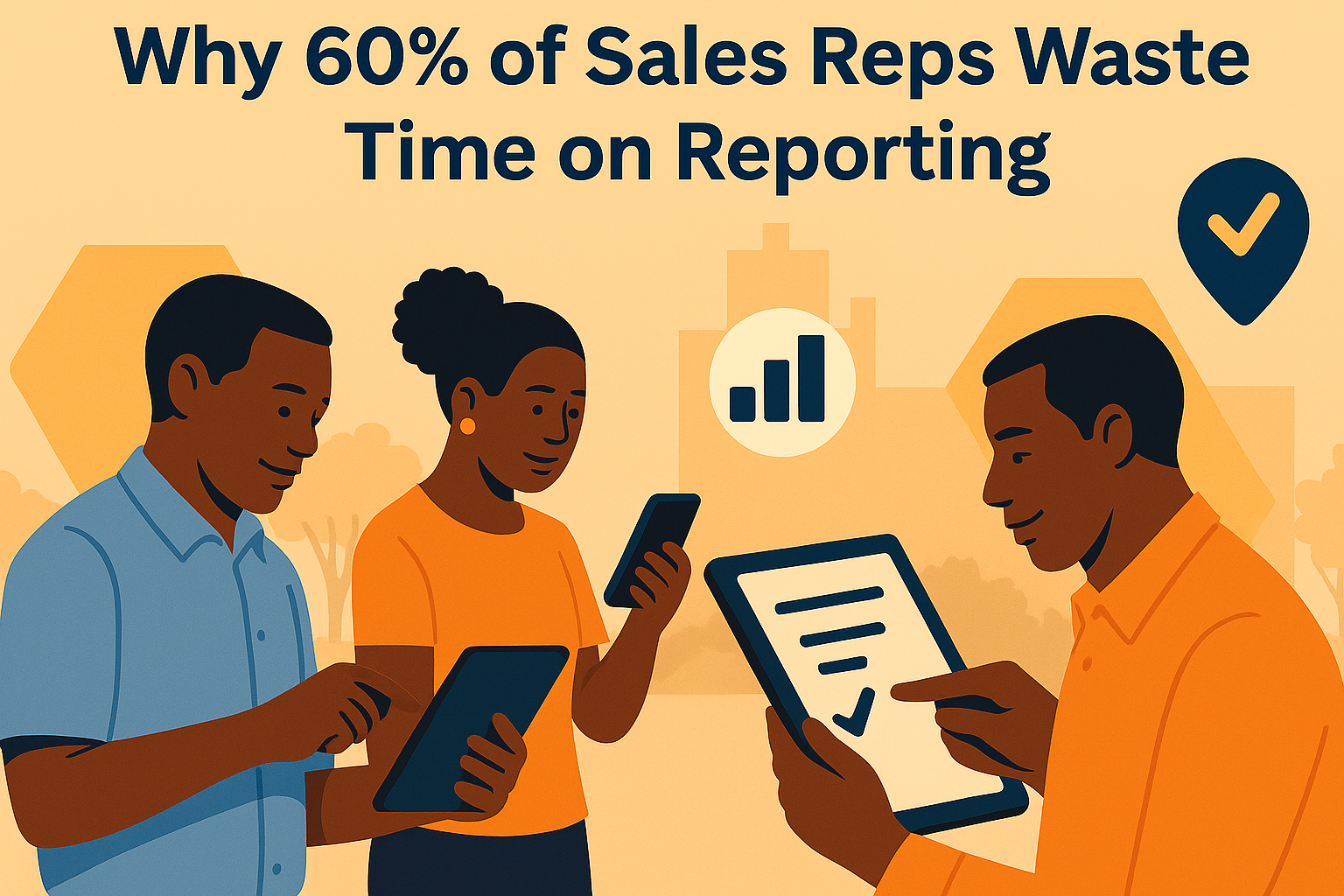Introduction
Across Africa, field sales representatives are at the heart of growth for FMCG, telecom, and distribution companies. Their role is complex: covering vast territories, dealing with traffic congestion in cities like Lagos, Nairobi, or Abidjan, and visiting dozens of retail outlets — from neighborhood kiosks and open markets to supermarkets.
Yet despite their strategic importance, most of their time is still lost on a single administrative task: manual reporting.
According to internal data, more than 60% of a sales rep’s working hours are spent filling out reports instead of selling, executing, or building customer relationships.
The Daily Reality of Field Sales Reps
In bustling African capitals, a sales rep might spend hours commuting before even reaching clients. Once on site, their mission includes:
- Recording sales and stock levels,
- Negotiating orders with retailers,
- Checking brand visibility on shelves,
- Sometimes collecting cash payments.
But instead of focusing on these core interactions, they’re slowed down by outdated tools: paper forms, Excel files, WhatsApp messages, or endless phone calls.
👉 The result? Fewer visits, lower sales productivity, and incomplete data.
Why Manual Reporting Is a Major Bottleneck
📝 Duplicate entry: writing in notebooks, then retyping data in Excel or sending updates via WhatsApp.
⏳ Time lost: several hours per week spent on administrative reporting.
❌ Lack of reliability: errors, missing figures, and inconsistent data.
🔄 No real-time visibility: managers receive reports too late to act.
📂 Scattered information: data spread across multiple channels with no consolidation.
In a fast-growing, competitive market like Africa’s, this lack of reactivity translates directly into lost revenue and slower growth.
The Direct Impact on Commercial Performance
📉 Lost sales: less time in the field means fewer orders taken.
🚦 Reduced market coverage: reps visiting fewer clients per day.
🤯 Lower motivation: manual reporting is perceived as tedious and demotivating.
🔎 Poor data quality: management decisions based on incomplete or unreliable information.
🏪 Limited retail visibility: lack of insights by zone, channel, or outlet type.
A Ghanaian distributor who digitalized their reporting process saw each sales rep gain the equivalent of one extra workday per week — time fully dedicated to selling and client visits.
How Digitalization Transforms the Field Sales Routine
Solutions like FieldPro simplify reporting and boost field efficiency through automation and mobile data collection.
1. Mobile Data Entry, Even Offline
Sales reps record sales, stock levels, and merchandising checks directly in the mobile app — no more paper, Excel, or WhatsApp reporting.
2. Automatic Data Consolidation
All field data flows into a central dashboard.
Managers can monitor visits, sales performance, and exceptions in real time.
3. More Reliable and Transparent Reporting
Each entry is timestamped, geolocated, and standardized.
No more missing or inflated figures — decisions are based on verified data.
4. More Time for Customer Relationships
With less time wasted on admin work, reps can visit more outlets, strengthen relationships with distributors, and generate additional revenue.
Real Case Example
A biscuit distributor in Senegal digitalized their sales reporting with FieldPro.
In six months, they achieved:
- +30% more client visits per day per rep,
- –60% less time spent on reporting,
- +15% sales growth, simply by refocusing on high-value activities.
Conclusion
In Africa’s fragmented and fast-moving retail landscape, continuing to rely on manual reporting means slowing down your sales force and losing competitiveness.
Companies that digitalize their field operations with FieldPro give their teams back valuable time, improve data accuracy, and gain full visibility across their distribution network.
🔶 Want to free your sales reps from manual reporting?
👉 Book a FieldPro demo today.







